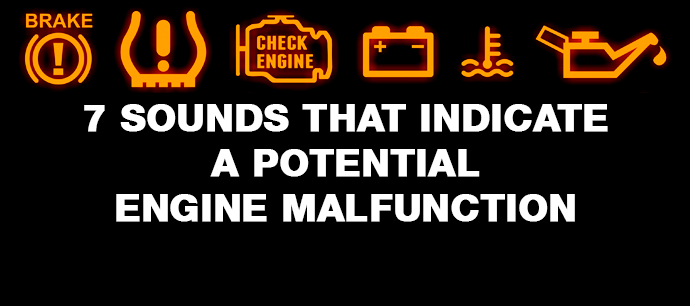7 sounds that indicate a potential engine malfunction
 7 sounds that indicate a potential engine malfunction
7 sounds that indicate a potential engine malfunction
Vehicle engines often fail to work due to wear and driving conditions. However, many cars reach the repair shop quite late and repair takes longer and is more expensive. You don’t need to be a specialist in engine maintainance to identify engine problems as soon as they appear.
Often, if you know how to identify some unusual car noises, you can easily describe a possible problem to a mechanic and he will fix it faster. Please see below which are the most frequent 7 sounds that indicate a possible engine malfunction:
1. Loud bangs
If you hear such sounds coming from the engine while driving, most likely the bearings are worn or there are automatic gearbox problems. Make sure you tell your mechanic the sounds you hear so that he identifies the problem easier and repairs it quickly.
2. Cracking
Such noises indicate that you are using a fuel that is too low quality for that specific engine power. A simple solution is to replace it with one that has a higher octanes value. If sounds do not disappear, you should visit a repair shop soon.
3. Friction noise
It is one of the most common sounds that may indicate a fault in the engine. If you hear a sound like a whistle when you press the brake pedal, surely it is time to change the brake pads because they are worn.
4. Squeaking
This sound indicates problems with the transmission belts or air conditioning compressor belt. Moreover, this noise can be a sign that the fan is loose. As soon as this noise is frequent, it is time to ask your mechanic to check the components listed above.
5. Thumps
In the presence of such sounds especially on starting the machine, you should check the exhaust pipe because there are chances that it be cracked. If you cannot see anything with the naked eye, but the noise persists, a visit to a repair shop is still necessary to check what causes the thumps.
6. Rumble
A sound like a barrel rolling indicates a problem with the bearings. They are too worn and should be changed immediately. Do not wait too long to make a visit to your repair shop because you risk damagingother components since the bearings no longer work 100%.
7. Ticking
A ticking that increases in frequency when the engine is powered, indicates that some engine parts are not lubricated properly. In this respect, either the problem is low oil level or the oil has not been changed for a long time.
Next time you hear a strange sound while driving, go through the list above and you will be able to easily describe the engine problem to a service technician and he will be able to fix it faster and cheaper.







